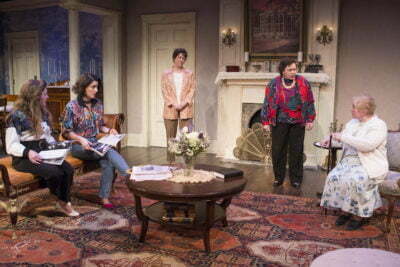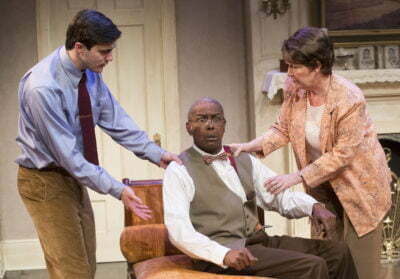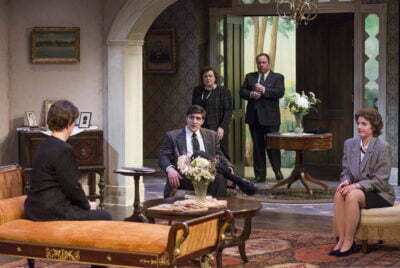Dividing the Estate
Directed by Cody Estle
Produced by Raven Theatre
Dark Comedy in Changing South
Among the vast number of American plays that riff on Chekhov’s The Cherry Orchard and depict arguments over a house, Horton Foote’s Dividing the Estate is a bit of a rediscovered gem. Though it premiered in 1989, a short run on Broadway from 2008-2009 shortly before Foote’s death rekindled interest in the play, and since then it has been widely performed as though it were a hot new work. Now, it has arrived at Raven Theatre, where director Cody Estle presents it as a dark comedy about a selfish family getting their just deserts, but dragging a few innocents along with them.
It is 1987, and the Gordon family home is the last of the antebellum estates in the fictional town of Harrison, Texas, located about an hour outside of Houston. The elderly Stella (marssie Mencotti) lives there with her drunk gambling son Lewis (Ron Wells), daughter Lucille (Millie Hurley-Spencer), and Lucille’s son, called Son (Tim Martin). Poor Son is tasked with keeping this estate going, and it’s not easy with the difficulty of growing cotton on a farm surrounded by new development. Stella recognizes the difficulty of his position, and generally rules with an iron hand in support of him, but has a weakness for giving Lewis and her other daughter Mary Jo (Joann Montemurro) whatever they ask for when they “need” it and still retains three servants, including her childhood friend-turned old coot Doug (J.J. McCormick).
Despite getting as much of their inheritance up front as they ask for, Lewis and Mary Jo rather resent having to ask for it, particularly as Lucille and Son are paid salaries instead of having to borrow. Mary Jo and her husband Bob (Jon Steinhagen) show up one day with their daughters Emily (Kathryn Acosta) and Sissie (Angela Sandall) to demand the estate be divided immediately. It seems Mary Jo and Bob are in deep financial trouble due to overspending and a recession, and Lewis has some personal trouble that needs smoothing over with ten thousand dollars. Son decides this would be the perfect time to announce he is getting married to a schoolteacher, Pauline (Eliza Stoughton). The dinner is not cordial, and when death strikes the household, it begins to dawn on the battling siblings that the estate may no longer be able to bail them out of their bad decisions after all.
The center of the show, the house itself, was beautifully designed by Jeffrey D. Kmiec. Though the paint is wearing out in the middle section and some floorboards are missing, it is still splendid in an old-fashioned way. Scenes from the Ottoman Empire are printed on the wall paper in the dining room, and a Persian carpet occupies every room. Since it’s the eighties, costume designer Kate Murphy had some fun with the obnoxious sisters Emily and Sissie and weepy burnout Uncle Lewis, but otherwise keeps restrained. One interesting spectacle is the full meal by props designer Julia Carusillo that the actors playing the servants bring out. It could get you hungry.
The acting is all strong enough to clearly convey the characters. Montemurro’s raging as Mary Jo sets her up as an antagonizing figure in contrast to Hurley-Spencer’s authoritative, calm pronouncements as Lucille. But is soon clear Lucille cannot really justify why she is on salary, and generally lies to make herself sound smart, much to Mary Jo’s exasperation. As master and trusted servant, Mencotti and McCormick are deeply rooted to humorous effect in a past only they keep alive, though Mencotti’s Stella has retained some wisdom and an instinctive recognition of good character. Martin’s Son and Stoughton’s Pauline display infinite patience with the lunatics surrounding them, and perhaps are the only people uncorrupted by greed due to Son’s knowledge of the estate’s true prospects. But even Stoughton’s uncle Bob is really just trying to protect his family from humiliation and desperation that is only mostly of their own doing.
Dividing the Estate isn’t deeply profound or moving, and I doubt it’s meant to be. When you think about the Gordons’ situation, they still fare a lot better than almost any other acrimonious family in a drama, and their secrets aren’t really dreadful. But then again, the lifetime of jealousy and insulation from consequences their dwindling resources enabled has left them warped and with little chance of achieving happiness. They’re a little sad, but Foote infused enough hope into their situation to make them okay to laugh at. Death is a frequent occurrence and topic of conversation in this play, so don’t go expecting it to be completely light-hearted. But it’s an enjoyable night of theatre nevertheless, and the young lovers Son and Pauline demonstrate how to survive annoying relatives by maintaining a healthy perspective.
Recommended
Jacob Davis
Reviewed February 2, 2015
For more information, see Dividing the Estate’s page on Theatre in Chicago.
Playing at Raven Theatre, 6157 N. Clark Street, Chicago. For tickets, call 773-338-2177 or visit raventheatre.com. Tickets are $36 with discounts for seniors, students, and teachers. Plays Thursdays-Saturdays at 7:30 pm and Sundays at 3:00 pm through March 28. Running time is two hours and fifteen minutes with one intermission.




